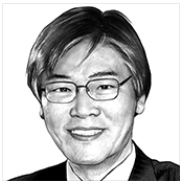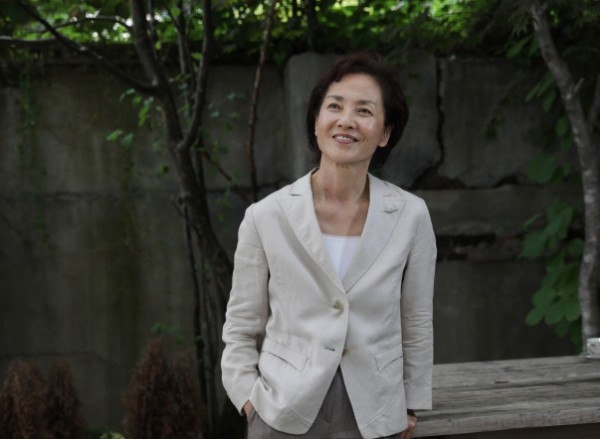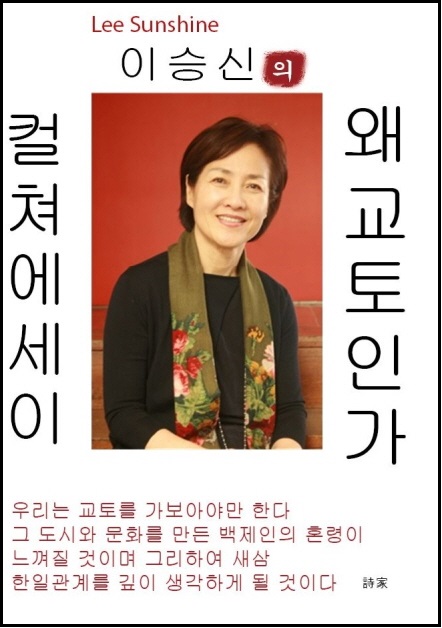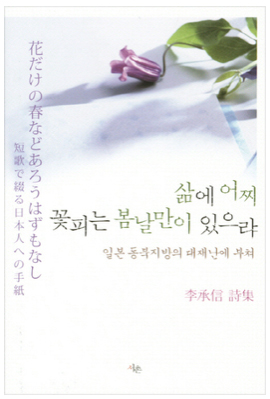Joong Ang Ilbo July 14 2018
INTERVIEW [Into People by Bae Myungbok] Writer Lee Sunshine
Columnist Senior Columnist Bae Myungbok
“Japan Passing” is our loss, we need Japan as much as the USA or China
Usually what someone does defines what kind of person they are. Sunshine Lee. She’s a Poet and essayist; a writer and publishing planner who writes and publishes her own books; and a broadcaster. But after several questions and hearing her answers, I felt that it was useless to try to define Lee Sunshine. Writing or words are mere tools for her. They are a means to realize the friendship between Korea and Japan to a lesser extent, and world peace to a greater extent. I guess “peace activist” might be an apt name for her.
The Japanese place a high value upon heart
It all started in Kyoto, the ancient capital of Japan. A month ago, a copy of book that came into my hands like fate reminded me of the faded memories of Kyoto.
Lee Sunshine recently studied classical literature at Doshisha University in Kyoto. She wrote on her experiences in Kyoto and published Why Kyoto. I read the book and set up an interview with her. At the time, Japan had just made headlines when its world cup team left behind a spotlessly clean locker room and its fans picked up even after Japans’ defeat.
Q The world media is complimenting Japan’s world cup team and supporters.
Lee Sunshine went to Japan for an international youth conference for the first time when she was a student. Since then she has been to Japan more than 100 times. She also stayed in Japan to study classical Japanese literature for a year and a half in 2015.
Q As a visitor, you described Kyoto as “a distant homeland in heart” How was living in Kyoto? It’s true that our ancestors and their descendants made and taught many things for the Japanese. Yet, the Japanese preserved the cultural heritage and didn’t destroy the old in order to build the new. They kept the tradition and turned it into their own culture. I cannot but admire at those achievements and endeavors as well as their spirit.
Q So are you saying that Japan is as great as Korea? A I feel proud and thrilled that we share DNA with the people who crossed the Korean Strait to achieve this great culture. Short poems which were derived from our native songs were developed into Tanka in Japan and this eventually became Japan’s cultural heritage that the Japanese treasure and is taught in schools of advanced countries like France, the UK and the USA. What I want to emphasize is that we can do much better than Japan as we have that kind of DNA inside us.
Q We might share some history but Korea & Japan are quite different now. A “Take this as an example: Koreans say thank you just once. But the Japanese bow several times until the counterparty says it’s enough. Like relatives who drift apart over the years, we have become different over time. However, the Japanese who know history acknowledge that they have Korea ancestory in their roots.”
200,000 refugees from Baekje crossed the Korean Strait
Until Japan moved its capital to Tokyo in 1869 of the Meiji Restoration, Kyoto had been Japan’s capital for around 1,100 years. Kyoto is Japan’s 7th largest city with over 1,600 temples. There are also many old palaces and historic sites. It is also a mecca of high-tech industries like informational technology. The University of Kyoto also produced 10 Nobel laureates in the field of science.
Q Why Kyoto of all cities? Why not Tokyo or Osaka? A “I think of Kyoto as a touchpoint in hopes that Korea Japan relations will improve. In Kyoto, you can feel our old long lost homeland, and the breath of our ancestors from Baekje, Goguryeo, Silla and Gaya who contributed to creating Kyoto and its culture. In the generous spirit of a big brother who taught a younger brother, we should embrace Japan. We should hold hands with our neighbor with whom we share roots and proceed toward the future. In Kyoto we find the future of Korea Japan relations we should aim for”
Q It’s no use just talking. What practical endeavor would we need to engage in for Korea and Japan to have better relationship? A “We shouldn’t expect much from politicians who are only obsessed with getting votes. Japanese and Koreans should meet and ‘exchange hearts’ at an individual level. For various reasons, most Koreans have some sort of personal tie with Japan. I realized anew in Japan that the Japanese value ‘heart’ very much. Our ancestors did too, a long time ago. My mother wrote in a poem “I have an earnest wish that we may be countries without strife” I think this one line shows the earnest wish she held throughout her whole life”
Q Shouldn’t the earnest hearts of Koreans and the Japanese be intertwined with each other? A “That’s right. Each side should open up and meet each other with an open mind. We should continue with meetings and exchanges, trying to understand each other”
Q So are you saying that people to people diplomacy is important? A “The problem is that both of us know nothing about each other’s history. Of course, it’s wrong to distort history. If we go back in time to search for our roots, Korea and Japan are intertwined. When Baekje lost the war in 663, the number of refugees from Baekje that went over to Japan amounted to some 200,000. This included royals, aristocrats, scholars, top officials, intellectuals, artisans, technicians and ordinary people – refugees of various classes went over to Japan and spread the advanced culture and civilization.
A “If we want to unify with North Korea and become an advanced and unified country, we should hold hands with Japan as well and not through the pressure of the USA, but voluntarily and actively. That would be advantageous for us. I feel like we are focusing on North Korea too much and neglecting Japan. For unification to happen, the USA and China are important, but we need Japan too”
Columnist Senior Columnist Bae Myungbok bae.myungbok@joongang.co.kr
|









